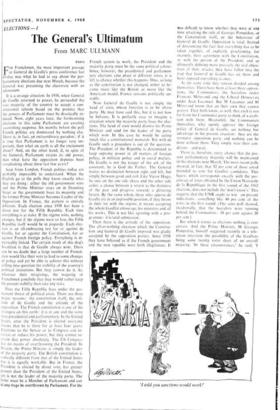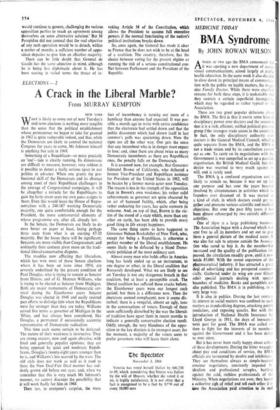The General's Ultimatum
ELECTIONS —1
From MARC ULLMANN
PARIS
FOR Frenchmen, the most important passage in General de Gaulle's press conference last Friday was what he had to say about the par- liamentary elections due next March, because the General was presenting the electorate with an ultimatum.
It is a strange situation. In 1958, when General de Gaulle returned to power, he persuaded the vast majority of the country to accept a con- stitutional reform based on the premiss that the powers of Parliament must be drastically re- duced. Now, eight years later, the forthcoming elections to this same Parliament are creating astonishing suspense. Six months before the poll French politics are dominated by nothing else. There is, in fact, an extraordinary paradox: if it is true that Parliament is no longer very im- portant, then whai on earth is all the excitement about? And, on the other hand, if, in spite of the General, Parliament retains its old power, then what have the opposition deputies been complaining about these last few years?
Seen from London, French politics today are probably impossible to understand. When the English go to the polls they know exactly what they are doing: either the old government wins and the Prime Minister stays on in Downing Street or the government loses its majority and the former Prime Minister becomes Leader of the Opposition. In France, the pattern is entirely different. Each election since 1958 has been a direct test for the Fifth Republic. Each time everything is at stake. If the regime wins, nothing changes, but if the regime were to lose, the Fifth Republic itself would be in jeopardy. Each elec- tion is art all-embracing test for or against de Gaulle, for or against the Constitution, for or against French foreign policy. Everything is in- extricably linked. The certain result of this dog's breakfast is that de Gaulle always wins. There can be no doubt that a large number of French- men would like their vote to lead to some changes of policy and yet be able to achieve this without calling into question the stability of the country's political insitutions. But they cannot do it. So, whatever their misgivings, the majority of Frenchmen conclude that they would rather keep the present stability than take any risks.
Thus the Fifth Republic lives under the per- manent threat of political crisis. There are three major reasons : the constitution itself, the atti- tude of de Gaulle and the attitude of the opposition. The French constitution is one of the strangest on this earth: it is at one and the same tune presidential and parliamentary. In the United States, once the President is elected everyone knows that he is there for at least four years. Elections to the Senate or to Congress can in- crease or reduce his power, but they cannot re- strain that power absolutely. The US Congress has no means of overthrowing the President. In Britain, the Prime Minister is simply the leader of the majority party. The British constitution is radically different from that of the United States hut it is equally workable. But in France, the President is elected by direct vote, has greater Powers than the President of the United States, yet is not the leader of the majority party. The latter must be a Member of Parliament and can at any stage be overthrown by Parliament. For the
French system to work, the President and the majority party must be the same political colour. Since, however, the presidential and parliamen- tary elections take place at different times, it is left to chance whether this happens. Thus, so long as the constitution is not changed. either to be- come more like the British or more like the American model, France remains politically un- stable.
Now General de Gaulle is not simply the head of state, whose function is to be above party. He may have said this, but it is not how he behaves. It is perfectly easy to imagine a Situation where the majority party loses the elec- tions. The head of state would dismiss his Prime Minister and send for the leader of the party which won. In this case he would be acting much like a constitutional monarch. Yet with de Gaulle such a procedure is out of the question. The President of the Republic is determined to keep supreme power in all matters of foreign policy, in military policy and in social matters. De Gaulle is not the keeper of the ark of the covenant, he is God the Father. The General makes no distinction between right and left, but simply between good and evil. Like Victor Hugo, he sees on the one side chaos and the other side order, a choice between a return to the darkness of the past and progress towards a glittering future. By the same token, those who oppose de Gaulle are in an impossible position; if they throw in their lot with the regime, it means accepting the whole Gaullist entourage, his ministers and all his works. This is not like agreeing with a pro- gramme: it is total submission.
Then there is the attitude of the opposition. The all-or-nothing situation which the Constitu- tion and General de Gaulle imposed was gladly accepted by the opposition parties. Since 1958 they have behaved as if the French government and the new republic were both illegitimate. It
was difficult to know whether they were at any time attacking the rule of Georges Pompidou, or the Constitution itself, or the behaviour of General de Gaulle. Opposition is total. Instead of denouncing the fact that everything has to be taken together, of explicitly proclaiming, for example, their agreement with the Constitution, or with the person of the President, and so ultimately defining more precisely the real objec. tives of their attacks, they have fallen into the trap that General de Gaulle has set them and have opposed everything at once.
At the same time they remain divided among themselves. There have been at least three opposi- tions. the Communists, the Socialists under Francois Mitterand and the Liberal Democrats under Jean Lecanuet. But M Lecanuet and M Mitterand know that on their own they cannot govern. They both know, as well, that each is too far from the Communist party to think of a coali- tion with them, Meanwhile. the Communists themselves, who openly approve the foreign policy of General de Gaulle, see nothing but advantage in the present situation: they arc the strongest opposition party and nothing can be done without them. They simply state their con- ditions --and wait.
There is, therefore, every chance that the pre- sent parliamentary majority will be maintained in the elections next March. The most recent polls showed, in fact, that 32 per cent of those asked intended to vote for Gaullist candidates. This figure, which corresponds exactly with the per- centage of votes obtained by the Union Nationale de la Republique in the first round of the 1962 elections, does not include the 'don't know's.' This suggests that the UNR ought to win-- on present indications-- something like 40 per cent of the votes in the first round. (The same poll showed, incidentally, that the Socialists were running behind the Communists: 18 per cent against 20 per cent.)
But when it comes to elections nothing is ever certain. And the Prime Minister, M Georges Pompidou, himself suggested recently in a tele- vision interview the possibility of the Gaullists being some twenty votes short of an overall majority. 'In these circumstances,' he said. 'I
'I told you sanctions would work!' would continue to govern, challenging the various opposition parties to reach an agreement among themselves on some alternative solution.' But Id Pompidou did not conceal that the real objective of any such operation would be to detach, within a matter of months, a sufficient number of oppo- sition deputies to give him an effective majority.
There can be little doubt that General de Gaulle has the same objective in mind, although he is being less diplomatic about it. He has been waving in veiled terms the threat of in- yoking Article 16 of the Constitution, which allows the President to assume full executive powers if the normal functioning of the nation's political institutions breaks down.
So, once again, the General has made it clear to France that he does not wish to be at the head of a coalition. The country, therefore, has the choice between voting for the present regime or running the risk of a serious constitutional con- flict between Parliament and the President of the Republic.



































 Previous page
Previous page